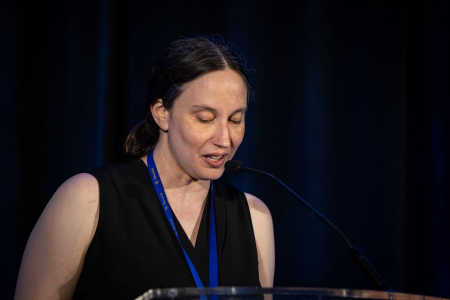Revoice: Churches on left and right mishandle Christians struggling with same-sex attraction

Both theologically conservative and liberal churches have not adequately ministered to Christians struggling with same-sex attraction, according to a Revoice Conference speaker.
In the keynote address at the Revoice Conference in Saint Louis, Missouri, Johanna Finegan stressed that "we are confronted with two churches of glory: one to our left, one to our right." She anchored her remarks on some of Martin Luther's writings and 1 Corinthians 1:23, where the Apostle Paul speaks of Christ's crucifixion being a stumbling block to Jews and foolishness to Gentiles.
The mission and vision of Revoice is to encourage "gay, lesbian, bisexual, and other same-sex attracted Christians — as well as those who love them — so that all in the Church might be empowered to live in Gospel unity while observing the historic Christian doctrine of marriage and sexuality," according to its website.
Finegan stressed that on the left, the church looks to their sexual ethic and says: "This can't be what God wants," which is "a little bit like the cross which was foolishness to the Greeks."
The church on the right, she added, looks at their lives, particularly at their gay identities, and says: "This can't be how God works," which is a little bit like the cross, a stumbling block to the Jews.
"Both look at us and are confounded and offended," she said.
Finegan lamented that those with same-sex attraction who identify in one way or another with the LGBT acronym are "theologians of the cross," caught between two theological camps, and both are unable to face the moral and experiential truths of their lives.
The church on the left believes doubting and denying the goodness of same-sex unions is evil, she said, noting an exchange she had with a religious leader who affirmed homosexual practice. Yet he always seemed to have an elaborate response for why the biblical texts on marriage and sexuality do not really say what they appear to say.
"The interpretive strategy he (the LGBT-affirming leader) was using would have been able to deal with and do away with anything that Paul, or Jesus, or Moses possibly might have said," on the subject, she explained.
But the whole point of the Christian faith is that God had to become a man to show us how it works, that human being themselves could not figure it all out on their own, she emphasized.
As confusing and counter-intuitive as the traditional sexual ethic seemed to her, an ethic she ultimately embraced, so too was the reality of the Incarnation and the Gospel — that God had to die to liberate people free form the power of sin and reconcile them to Him.
Yet the church on the right does not seem to be able to call a thing what it is, she said.
"How much of the anxiety about language is about the desire to obfuscate, to refuse to speak plainly?" she said.
"If I only ever say, 'I experience same-sex attraction,' that leaves it open [as to] how big or little an issue it might be. You can imagine me as one of those mostly healed people who has a stray homosexual thought on occasion since, after all, none of us will be totally sanctified this side of Heaven. But if I tell you I'm gay, all of that wishful thinking is shattered, and, horror of horrors, you see me as I am."
According to the description on Revoice's YouTube channel, Finegan first got involved in a dialogue project on faith and sexuality in 1997 when she was a sophomore in college, identifying as both gay and an atheist at the time. She received Christ in 1998 but she had "underwhelming" experiences with an ex-gay ministry, and decided she would be gay and celibate. Yet in 2004 she met a man with whom she wanted to spend the rest of her life and then married him and had two daughters.
"As a heterosexually-married woman I've been shocked and heartbroken about how straight Christians who know about my past assume that I have been healed," she said, explaining that she opted to return to the word "gay" to resist that assumption.
She added that she remains predominantly same-sex attracted, and does not think it wise to cover that up with sentimental Christian cliches and language.
Neither the left nor right Christian camps can accept their weaknesses, she went on to say.
Pro-LGBT clergy in St. Louis wrote a letter condemning the Revoice Conference last year, arguing that their content amounted to "spiritual violence" that was unwelcome in their city.
"They think our weakness [related to sexual struggle toward a biblical standard] is absurd," she said of the liberal voices that blasted them.
Meanwhile, Finegan continued, the church on the right seems to say: "We're really uncomfortable with you being weak in this way, so it would be really great if you could take care of that ASAP or at least hide it if you can't."
"Part of the theology of the cross is that I remember what's inside me," she said, explaining that she wanted to feel free to speak openly about the struggle.
"There is a huge difference in the levels of humble, honest, open, vulnerable willingness to talk about the reality of their present experience."
She commented that authors Rosaria Butterfield and Christopher Yuan, both of whom once identified as homosexual, no longer talk about the present state of their sexual journeys. Butterfield is now married to a man and has children; Yuan remains celibate.
She praised as "life-giving" the work of Wesley Hill, Greg Coles, and Eve Tushnet, Christian authors who adhere to a traditional sexual ethic yet continue to experience same-sex attractions and have written books about what they've experienced and how they live their lives as sincere Christians who struggle.
Revoice is an effective platform for people to talk about these issues, she said, because it is a space where people can say, "Hey, I'm trying to follow Jesus with this too. Here are some things that are tough for me. Here are some things that have helped me. Here are some things that I've learned."
She added that while she did not think it was impossible for changes in sexual attraction to occur, she has not seen any credible cases of it happening among her acquaintances who have been predominantly same-sex attracted since puberty.
The first Revoice Conference, which occurred last year, came under considerable criticism from conservatives who argued that conference speakers were incorporating deceptive, unbiblical language and themes and were thus paving the way to compromise. In response, Revoice organizers maintained that despite their differences they were not compromising on their stand for the historic Christian sexual ethic and urged greater understanding.
Conservative churches are sick of hearing about the same-sex oriented themes from the world, Finegan said.
"But if you are feeling pressure from our culture, can you imagine what we're feeling?" she asked.
"This perfect storm of world, flesh, and devil that we're up against right now, how relentless the temptation is, all the voices that say, 'you're hurting yourself, you're denying yourself, why would you pay attention to some ancient book anyway? You're going to trust those people and their interpretation over the cry of your own body? What kind of a pathetic, self-loathing twit are you?'"
"Church, I'm sorry this makes you uncomfortable. I need you to know, I need you to pray, I need you to encourage me and tell me I'm not a complete idiot for trusting Jesus sometimes. I might need you to cry too. I might need you to hold me accountable. I might need you to rejoice with me in how God is actually sanctifying me," she said, noting that the souls of same-sex attracted people are presently under ongoing strain.
She concluded: "I am sure God prizes the striving for sexual holiness in all of His saints. But it seems to me that He gets a special honor from the predominantly same-sex attracted person who confesses and obeys a biblical sexual ethic that He doesn't get from the happily married and well-satisfied straight couple."





















